Carl E. Olson's Blog, page 109
February 21, 2014
Bishops—The First Ones Called to Preach the Gospel of Life
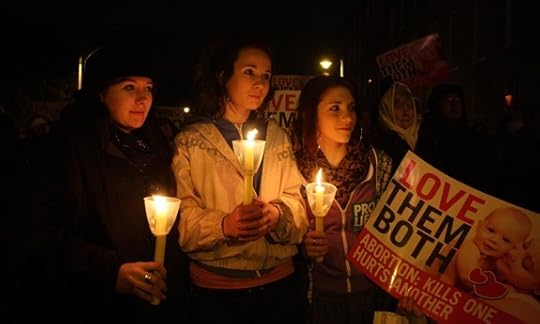
Young women hold candles as they gather for a pro-life vigil outside the Irish parliament in Dublin in January 2013. (CNS photo/John McElroy)
Bishops—The First Ones Called to Preach the Gospel of Life | John Smeaton | CWR
A pro-life leader in the UK calls on bishops worldwide to throw their support behind efforts to strengthen a Culture of Life.
Editor’s Note: The following was delivered as an address to the Catholic leadership organization Legatus at its annual summit in Orlando on February 8.
Ladies and gentlemen, I have worked in the pro-life movement for 40 years, for 39 years at the national level in the United Kingdom for the Society for the Protection of Unborn Children (SPUC), the first pro-life group to be established anywhere in the world, and the largest pro-life group in Europe. For 36 of those 39 years I have worked for the pro-life movement on a full-time basis, from 1978 as SPUC’s general secretary, and from 1996 till now as the Society’s chief executive. SPUC was formed in 1966, six years before Roe v. Wade, and one before 1967, when abortion was legalized in Britain. At the ripe old age of 16, I studied, briefly, for the priesthood in Ireland, in the Salesian novitiate of County Meath, but decided that my calling lay elsewhere. Sixteen years later, in London, I met Josephine Clarke, who, with most of her 14 brothers and sisters, grew up in County Meath, to which we returned for our honeymoon in 1984. We have four children and five grandchildren, we live in north London, and I am overjoyed and so grateful to Legatus that Josephine could be with me for this great convention.
Today, I wish to offer a perspective on the current world situation on abortion and the role of Catholic Church officials through experiences from our side of the “pond,” including our experience in Ireland, which you may wish to compare and contrast with the situation in your own bailiwick.
The Society for the Protection of Unborn Children (SPUC) was formed in 1966 to campaign against the legalization of abortion by statute in Britain. Over the decades, we have also mounted major campaigns against abortion in Ireland and in the European institutions, the European Union and the Council of Europe. Like you in the US, we have achieved some extraordinary successes, and saved many lives; and we have also experienced terrible setbacks involving deeply disturbing advances in the culture of death. These campaigns have opened our eyes to other related evils and injustices, such as euthanasia, assisted suicide, corrupting sex education in schools, and, recently, same-sex marriage.
In certain quarters, I know that associating the issue of same-sex marriage with abortion is frowned upon.
February 20, 2014
"Do No Harm" Captures the Struggles of Catholics in the UK
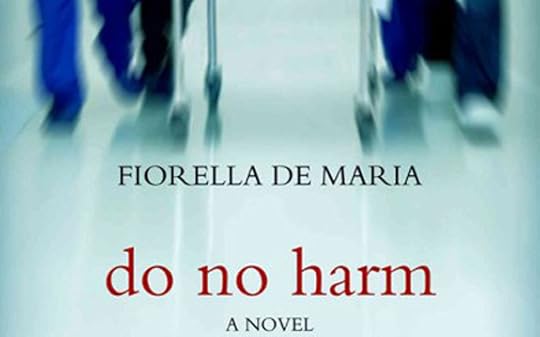
Do No Harm Captures the Struggles of Catholics in the UK | Dorothy Cummings McLean | CWR
Fiorella de Maria's new novel is driven by vivid characters and a tense, believable plot
Apparently it is unusual for one Ignatius novelist to review another, but I cannot resist chatting about Fiorella de Maria’s excellent legal thriller Do No Harm. This is partly because, like De Maria, I am a Catholic migrant to the United Kingdom and, to a certain extent (for I live in Scotland, not England), the legal, medical and ecclesiastical systems she describes affect me, too. And as I read her story, I began to recognize other aspects, and perhaps actual personalities, of Catholic British life. Only a million Catholics in England and Wales bother go to Mass on Sunday; British Catholics live their devotional life in a small pond. 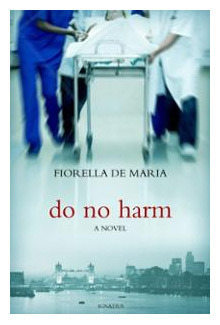
Do No Harm centres around the fate of Dr. Matthew Kemble, an English physician who is charged with assault and battery after saving the life of a suicidal young woman with a so-called “living will.” Daisy comes from an aristocratic family with historical ties to the eugenics and euthanasia movements. Dr. Kemble had campaigned fruitlessly again the “End of Life Care Bill”, never suspecting that he himself would be the first doctor whose conscience it would seek to override. Daisy’s brother, furious that Daisy had received life-saving care, reports Dr. Kemble to the police. Before long, Dr. Kemble is arrested at home in front of his wife and four small children and led to a waiting police car in handcuffs. Daisy lies in a coma.
Although the story is told from several points of view, the role of protagonist lies equally between Dr. Kemble and his solicitor’s assistant, Maria. As a passionate, twenty-two-year-old law student and Catholic activist, Maria serves as an excellent foil to the mild-mannered, middle-aged, almost milquetoast Matthew. Matthew is the kind of old-fashioned, upper middle-class public school boy (the Jesuit school he and his solicitor attended is almost certainly Stoneyhurst) who thinks being noticed is in terrible taste. Although descended from English Catholic martyrs, he has no wish to become one himself. Maria is, in the words of her employer Jonathan Kirkpatrick, “fairly typical of that John Paul generation of London Catholic…orthodox, highly strung, highly educated, take themselves far too seriously, but we can forgive them that.” She also has a taste for risk and adventure, which gets her ejected from buildings, arrested and eventually beaten black and blue. Matthew is a loveable martyr because he isn’t cut out for martyrdom. Maria is a loveable heroine because her ruses never work.
Both the plot and a sub-plot concerning a pregnant Chinese teenager at risk of deportation are compelling, and the pacing is good. What impresses me most about the book, however, are the characters. Either De Maria has based solicitor Jonathan and his wife Freya Kirkpatrick closely on people I know, or she has pulled off the author’s magic trick of making a reader believe the characters must be real. They are wonderfully vivid, both because De Maria makes harmonious contrasts—sensitive Matthew is a family man with a Madonna-like Spanish wife; charming Jonathan is childless and married to an old-fashioned “jolly hockey sticks” Englishwoman—and because she has an eye and ear for detail. If you have romantic PBS fantasies about London, De Maria expels them for you. London is a tough, crowded, multi-ethnic place, absolutely lousy with class divisions and resentments.
The plot is is all too believable. A Scottish doctor snarls that Matthew’s trial is obscene: “The state doesn’t want honest, hardworking, conscientious doctors. It wants automatons following procedures.” One of the the most uncomfortable aspects of my life in the UK has been dealing with doctors who keep offering me IVF treatments despite my repeated assertions that as a Catholic I have serious moral objections to IVF.
My one argument with the book, or with the character Maria, is the unexplained anti-English feeling. Maria, reveals only on page 159 that she is “not bloody English.” As Maria went to a girls’ boarding school and to Oxford and works like the dickens for illegal migrants without mentioning her own foreign origins, I was very surprised to read this. Later Maria trashes the native English thusly: “It was so, so very English! All these frosty people trapped behind their own ironic detachment, too cowardly to reach out and empathise with any other member of the human race—let alone someone of whom they did not approve—until they had forgotten how it felt to feel the stirrings of human affection and solidarity.”
Well, steady on, there, Maria. Meanwhile, she’s never been to Scotland, so is she Welsh? Irish? Polish? (The only non-English characters Maria holds in dislike are Polish.) Since one of the themes of the book is the lack of British sensitivity to illegal migrants, her own roots do indeed matter.
Britain’s unprecedented mass migration is seen almost entirely from an immigrant’s point of view; the culture-shocked English working classes make their appearance in the novel solely as unsympathetic bureaucratic drones or thugs. If not English, Maria is terribly British in that she is deeply influenced by the vampirish class system. She loathes both “arrogant toffs” and button-pushing prols while adoring (and, by virtual adoption, belonging to) the Oxbridge educated, Catholic segment of the upper middle classes. Of course, Maria’s class prejudices make her all the more believable as an authentically British character.
My conclusion is that this, at last, is a novel about us, which is to say, faithful, university educated Catholics in the UK today. I will certainly recommend this book to all my Catholic friends, and if the bureaucratic British powers that be would like to know what educated, faithful British Catholics think of them, they need only read Do No Harm.
Do No Harm: A Novel
(also available in Electronic Book Format)
by Fiorella de Maria
Ignatius Press, 2013
Hardcover | 235 pages
February 19, 2014
Save 20% on brand new titles from Ignatius Press

Offer ends Tuesday, February 25th, 2014 at 12:00 midnight EST.
These prices are available online only through Ignatius.com
20% off Brand New Titles from Ignatius Press!
For Lenten sale titles see pages 8-11 of our Lent catalog, available here.
Books
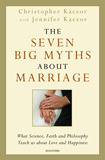 The Seven Big Myths about Marriage
The Seven Big Myths about Marriage
Christopher Kaczor
This work explores some of the most interesting and vexing problems in contemporary life. Appealing to reason rather than religious authority, the book tackles the most controversial and talked about positions of the Catholic Church - on contraception, on marriage, on reproductive technologies, on cohabitation, and on divorce - arguing for the reasonableness of the Church's views on these issues.
The book's interdisciplinary approach, following the precedent of Thomas Aquinas, looks to human happiness and fulfillment, properly understood, in seeking the answers to questions about how to live. It aims to show to skeptical readers that what the Catholic Church teaches about controversial issues is rationally justified by considering evidence from psychology, sociology, and philosophy. Also available as an e-book.
Regular price: $19.95, sale price: $15.96
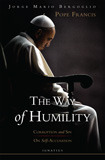 The Way of Humility
The Way of Humility
Jorge Mario Cardinal Bergoglio
Originally a series written by Pope Francis while he was Cardinal Archbishop of Buenos Aires, these profound meditations give an inspiring introduction to the path of humility and love needed to form true Christian communities. They are divided into two separate works, Corruption and Sin, and Self-Accusation.
As the Archbishop of Buenos Aires, Pope Francis ministered in a country that suffered greatly from the effects of corruption in public and private life. In these texts, the current Holy Father reflects on the connection between sin and corruption in the life of every Christian and how pride and self-sufficiency lead from one to the other. The roots of many of the themes of his pontificate can be found in these texts on humility, honesty and simplicity.
The two pieces are on different but related issues. The difference between sin and corruption and the remedy for sin, which is self-accusation, meaning telling oneself the truth about one's faults. In short, pride is the problem; humility is the solution.
Regular price: $12.95, sale price: $10.36
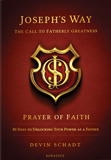 Joseph's Way: The Call to Fatherly Greatness
Joseph's Way: The Call to Fatherly Greatness
Devin Schadt
Become the Father You're Called to Be.
Society goes by way of the family and the family goes by way of the father. If you want to change the world, change the human father. Joseph's Way: Prayer of Faith is the first release of a two volume series which transmits the biblical vision of fatherhood, its necessity, its glory, and its irreplaceable effect on families and society. Joseph's Way is a tough, bold, game-changing challenge to men of our age to pursue fatherly greatness. By comparing St. Joseph -Light of Patriarchs -with the great patriarchs of old-Abraham and Jacob -Joseph's Way provides fathers with invaluable practical tools and profound spiritual insights to help them become the great father that God has created them to be.
Regular price: $16.95, sale price: $13.56
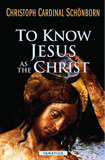 To Know Jesus As the Christ
To Know Jesus As the Christ
Christoph Cardinal Schoenborn
This book contains a cycle of catechesis, or teachings on the Christian faith, which pose fundamental questions with respect to the confession of the faith: How can God be one and triune? How can He be all powerful and at the same time permit evil? Is our life free or pre-determined? How is Christianity different from other religions? How are we to understand the signs and miracles of Jesus? Why must we believe in the Resurrection of Jesus and hope in our own life after death?
Cardinal Schoenborn explores these and many other important questions about the Christian faith, and especially about the life and teachings of Jesus Christ, in his usual lucid and compelling style. He leads us to a deeper realization of who Christ is, what his saving mission was, and how we can know and love Him in a personal and profound way.
An inspiring and practical work by a great churchman about the eternal importance of the Christian faith, and the life and teachings of Jesus Christ, and how it is crucial for our everyday life. Also available as an e-book.
Regular price: $14.95, sale price: $11.96
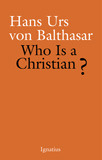 Who Is a Christian?
Who Is a Christian?
Hans Urs von Balthasar
The title of this book is a short question. In its longer form, the question would be: "In the changed circumstances after the 2nd Vatican Council-with its theme of aggiornamento or ‘updating', especially in the areas of the Bible, the Liturgy, Ecumenism, and openness to the modern world-what does it really mean to be a Christian today?"
Balthasar begins by acknowledging the confusion of many in the post-Conciliar period. He then describes the valuable contributions of the Council in those four areas. But he also describes their "shadows": what could go wrong and often did go wrong. Finally he points out the path to genuine renewal in the personal life of the Christian and in the Christian's service of the world. Also available as an e-book.
Regular price: $14.95, sale price: $11.96
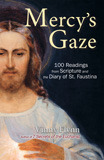 Mercy's Gaze
Mercy's Gaze
Vinny Flynn
Compiled by best-selling author Vinny Flynn, Mercy's Gaze breaks new ground as a first-ever themed collection of both Diary passages and Scripture verses intended to inspire prayerful reflection. Vinny has selected parallel passages from Scripture and the Diary of St. Faustina that develop key mercy themes and encourage you to gaze on Jesus. This is rich spiritual fare for 100 days of prayer and reflection, with the Diary revealed as a Gospel of Mercy.
Each topic has related sets of passages from both Scripture and the Diary. The format is intended to inspire prayerful reflection for 100 days, but it is the perfect companion for daily prayer, and can be picked up and used for inspiration or help with a particular struggle at any time. Includes pages for writing your own reflections, a full color reproduction of the Vilnius Divine Mercy Image, and an appendix of prayers.
Regular price: $14.95, sale price: $11.96
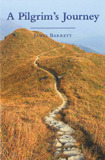 A Pilgrim's Journey
A Pilgrim's Journey
James Barrett
Life is a journey. It can also be a pilgrimage--a journey to God but only if we choose to make it so. A Pilgrim's Journey is a practical guide for thinking about and finding the way to God, and to making the journey to God a life well-lived. Bringing an attorney's intellect to bear on question of truth, James Barrett explores reason, science, conscience, and mystery to find a solid answer the question of life's purpose. A Pilgrim's Journey is a popular, accessible work of apologetics and evangelization. It refutes atheistic and secular humanist claims about God and human destiny and makes the case for Christian faith. At the same time, it is a meditation and personal reflection to help the reader turn mind and heart to God's love.
Regular price: $12.95, sale price: $10.36
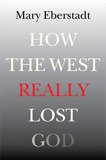 How the West Really Lost God
How the West Really Lost God
Mary Eberstadt
In this magisterial work, leading cultural critic Mary Eberstadt delivers a powerful new theory about the decline of religion in the Western world. The conventional wisdom is that the West first experienced religious decline, followed by the decline of the family. Eberstadt turns this standard account on its head. Marshalling an impressive array of research, Eberstadt shows that the reverse has also been true: the undermining of the family has further undermined Christianity itself.
Drawing on sociology, history, demography, theology, literature, and many other sources, Eberstadt shows that family decline and religious decline have gone hand in hand in the Western world in a way that has not been understood before-that they are, as she puts it in a striking new image summarizing the book's thesis, "the double helix of society, each dependent on the strength of the other for successful reproduction."
Regular price: $24.95, sale price: $19.96
Children's Books
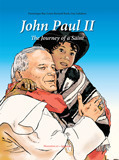 John Paul II: The Journey of a Saint
John Paul II: The Journey of a Saint
Dominique Bar, Louis-Bernard Koch, Guy Lehideux
This richly illustrated hardcover book tells the fascinating and deeply inspiring story of Pope John Paul II, who will be canonized a saint in April 2014.
Young people will be drawn to the well-crafted pictures and simple text that tells the dramatic and inspiring story of one of the most important figures of the twentieth century, one that many are already calling "John Paul the Great".
Regular price: $16.99, sale price: $13.59
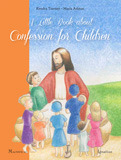 A Little Book about Confession for Children
A Little Book about Confession for Children
Kendra Tierney
The Sacrament of Confession is often misunderstood by children and adults alike. While your child is preparing for his first Confession, it's easy for you both to feel overwhelmed. And even if first Confession was a while ago, perhaps you wish that you and your child had a better understanding of the sacrament.
A Little Book about Confession for Children explains the hows and whys of going to Confession. It includes step-by-step instructions for preparing and receiving this beautiful sacrament of healing, which draws us into the infinite mercy of God. The book even provides an examination of conscience just for kids.
Everything you and your child need to know about the Sacrament of Reconciliation (or Confession) can be found in this informative little book with charming four-color illustrations. Perfect for preparing to receive the Sacrament of Reconciliation for the first time, this little book is sure to be used over and over again.
Regular price: $9.99, sale price: $7.99
February 17, 2014
New from Ignatius Press: "The Way of Humility" by Jorge Mario Cardinal Bergoglio (Pope Francis)
Now available from Ignatius Press:
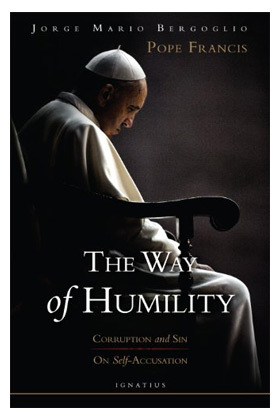 The Way of Humility: Corruption and Sin & On Self-Accusation
The Way of Humility: Corruption and Sin & On Self-Accusation
by Jorge Mario Cardinal Bergoglio (Pope Francis)
Originally a series written by Pope Francis while he was Cardinal Archbishop of Buenos Aires, these profound meditations give an inspiring introduction to the path of humility and love needed to form true Christian communities.
They are divided into two separate works, Corruption and Sin, and Self-Accusation.
As the Archbishop of Buenos Aires, Pope Francis ministered in a country that suffered greatly from the effects of corruption in public and private life. In these texts, the current Holy Father reflects on the connection between sin and corruption in the life of every Christian and how pride and self-sufficiency lead from one to the other. The roots of many of the themes of his pontificate can be found in these texts on humility, honesty and simplicity.
The two pieces are on different but related issues. The difference between sin and corruption and the remedy for sin, which is self-accusation, meaning telling oneself the truth about one's faults. In short, pride is the problem; humility is the solution.
The Pope states: "It will do us good to reflect together on the problem of corruption and also on its relationship with sin. It will do us good to shake up our souls with the prophetic force of the Gospel, which places us in the truth about things by stirring up the layers of fallen dead leaves of human weakness and complicity that can create the conditions for corruption. It will do us a lot of good, in the light of God's word, to learn to discern the different states of corruption that surround us and threaten to lead us astray. It will do us good to say to one another again, "Yes, I'm a sinner; but no, I'm not corrupt!"-and to say it with fear, lest we accept the state of corruption as just another sin."
Jorge Mario Bergoglio (Pope Francis) is the first Latin American to be elected to the chair of Peter. A native of Buenos Aires, Argentina, he served as head of the Society of Jesus in Argentina, then became the archbishop of Buenos Aires, and was elected to be the Pope in March, 2013.
Islam and Christianity, Dialogue and Monologues

Islam and Christianity, Dialogue and Monologues
Robert R. Reilly's monograph, The Prospects and Perils of Catholic-Muslim Dialogue, argues that the real problem with political and social structures in Islam is theological
Peter D. Beaulieu
In the middle of the ninth century the Caliph al-Mutawakkil abruptly terminated the Mu’tazilite school of Muslim rationalist theologians, thus leaving stillborn the earliest chance to harmonize Islamic belief with reasoned (“Hellenistic”) thought on man’s relation with God and each other. This early turning point is the focus of Robert R. Reilly’s inquiry into a sectarian Islam as much “at war with itself” as with the West. He joins Pope Benedict XVI (Regensburg Lecture, 2006) in focusing at the interreligious or intercultural level. Reilly is moderate in tone but incisive, non-polemical but direct, as he draws from a wide range of sources both Christian and Muslim.
Drawing from his earlier work (The Closing of the Muslim Mind), Reilly begins with formal Church pronouncements for interreligious dialogue and for collaboration on issues like justice and peace and life. The sticking point, not yet addressed in these documents, is our nevertheless (and profoundly) different understandings of the natures and relationships of God and man. From the historical background of Islamic theology we are led through Muslim responses to Church’s dialogue initiatives—material calling for attention and real debate. The following review should not substitute for reading The Prospects and Perils of Catholic-Muslim Dialogue, which this reviewer recommends to a broad citizenry as well as specialists and academics. Reilly’s audience includes leaders in interreligious dialogue and surely those positioned to restore the coherence of Christian witness under the New Evangelization.
With Hasan Hanafi of Cairo University, Reilly holds that the real problem with social, political, and economic structures in Islam is theological: the “inherited intellectual substructures.” It is at this level that “reform must take place and real dialogue be held.” Reilly notes that reason is not among the ninety-nine names for Allah (nor does the term “Father” appear in the Qur’an). Given the multiple perils from any imprecise framing of issues, the meaning or translation of basic terms (peace, justice), and the contradictory contexts in which identical things might be said, Reilly builds toward a critique of the three regional conferences on Catholic-Muslim Dialogue in the United States.
Referring to relevant litigation, the U.S. v. Holy Land Foundation trial (2008), he suggests that “if the FBI prohibits formal cooperation with un-indicted co-conspirators, perhaps the United States Conference of Catholic Bishops should also.” Based on access to only the published records, he plausibly equates some dialogue with cooperation. The bishops legitimize too routinely the most available (and radical) Muslims groups. The bishops might pause to consider Reilly’s documentation and weigh his conclusion that “Catholic-Muslim dialogue in the United States requires a major reevaluation in terms of the organizations involved, the personnel participating, and the substance addressed.” (Participants in the 2000-2011 Dialogue are listed in an Addendum.)
The Historical Context
Historically, the ninth century Mu’tazilites cut across all sects and schools of theology in their experimentation with a more reasoning Islam, but were blocked by the more cautious Ash’arites whose grip on Islam is barely diminished after twelve centuries.
February 15, 2014
New: "The Seven Big Myths about Marriage" by Christopher Kaczor
Now available from Ignatius Press:
by Christopher Kaczor
This work explores some of the most interesting and vexing problems in contemporary life. Appealing to reason rather than religious authority, the book tackles the most controversial and talked about positions of the Catholic Church - on contraception, on marriage, on reproductive technologies, on cohabitation, and on divorce - arguing for the reasonableness of the Church's views on these issues.
The book's interdisciplinary approach, following the precedent of Thomas Aquinas, looks to human happiness and fulfillment, properly understood, in seeking the answers to questions about how to live. It aims to show to skeptical readers that what the Catholic Church teaches about controversial issues is rationally justified by considering evidence from psychology, sociology, and philosophy.
The foundation of Kaczor's approach is happiness. We all want to be happy. Every day, in whatever we do, we seek this goal. But what exactly is happiness? And how can we find it? The saints and psychologists agree: there can be no real happiness without authentic love-erotic love, friendship love, and self-giving love (agape).
From this foundation of happiness Kaczor explores the nature of marriage, and the love they promise to each other, which is agape, a selfgiving love that is the choice to do good for the other. He also examines alternatives to covenant marriage, such as polygamy and samesex marriage, as well as cohabitation.
Finally the book explores the value of children. To make sense of Catholic teaching on contraception, he says that we must first reconsider the value of fertility and having children. Only in this perspective, can one begin to understand what the Church teaches.
Christopher Kaczor, Ph.D., a husband and father, is a professor of philosophy at Loyola Marymount University, and the author of The Seven Big Myths About the Catholic Church, The Ethics of Abortion: Women's Rights, Human Life, and the Question of Justice, Thomas Aquinas on the Cardinal Virtues, and Life Issues - Medical Choices.
Praise for The Seven Big Myths about Marriage:
"If I were a pastor, I would make this book required reading for engaged couples in all my marriage classes."
- Peter Kreeft, Ph.D., Author, Jacob's Ladder: Ten Steps to Truth
"The media portrayals of the public debates over marriage and its meaning often generate more heat than light. In this carefully crafted and accessible book, Professor Kaczor provides just the sort of illumination that is absent from those portrayals. I cannot think of a better book that offers such a clear and winsome account of marriage and its meaning, and what that tells us about human dignity and happiness."
- Francis J. Beckwith, Professor of Philosophy ,Baylor University
"Movies, television, and other forces have teamed up to deceive Americans about marriage--the institution that is very basis of society. They've done a spectacular job! They've sold myth after myth to the American people, and it's no wonder that marriage is in crisis today. That's why Chris Kaczor's new book, The Seven Big Myths about Marriage, is so timely. Only by learning to see through the lies can we build happy and healthy marriages."
- Jimmy Akin, Author, The Fathers Know Best
Jesus: Liberal Rabbi or Incarnate Messiah?
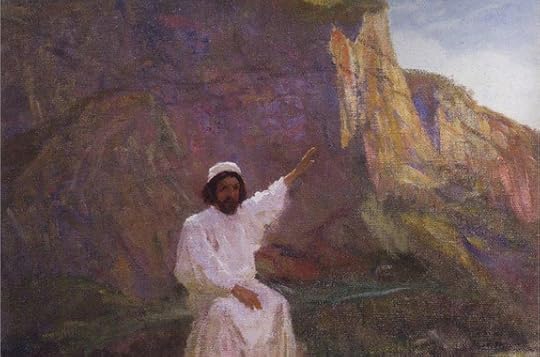
"Palestine. Sermon the Mount." by Vasily Polenov (c. 1900; WikiPaintings.org)
A Scriptural Reflection on the Readings for Sunday, February 16, 2014 | Carl E. Olson
Readings:
• Sir 15:15-20
• Ps 119:1-2, 4-5, 17-18, 33-34
• 1 Cor 2:6-10
• Mt 5:17-37
“Was Jesus in reality a liberal rabbi—a forerunner of Christian liberalism? Is the Christ of faith, an therefore the whole faith of the Church, just one big mistake?”
Those are fascinating questions, asked by Benedict XVI in his book, Jesus of Nazareth (Doubleday, 2007), in a lengthy chapter, “The Sermon on the Mount”. It is my favorite chapter of the book, filled with surprising insights into the greatest sermon ever given. But the Sermon on the Mount is more than just a “sermon”, as we normally think of that term, for as the Holy Father explains, it is “the Torah of the Messiah”—that is, the Law of Jesus Christ.
This Torah of the Messiah, writes Benedict XVI in a passage directly relating to today’s Gospel reading, “is totally new and different—but it is precisely by being such that fulfills the Torah of Moses”. And the “interpretative key” is a declaration by Jesus that has caused no small amount of confusion and consternation: “Do not think that I have come to abolish the law or the prophets. I have come not to abolish but to fulfill.”
Growing up as a fundamentalist Protestant, I recall hearing many times that Jesus had “done away” with the Law, having supposedly shown that it was no longer of any value or purpose. But that doesn’t make sense at all of Jesus’ strong statement: “Amen, I say to you, until heaven and earth pass away, not the smallest letter or the smallest part of a letter will pass from the law, until all things have taken place.”
This is, Benedict notes, a “statement that never ceases to surprise us.” That is the case, in part, because we often hear or assume a simple, but incorrect, contrast: The Law is bad, but Jesus is good. This often comes about through a misunderstanding of Paul’s writings about the Law. But neither Jesus nor Paul said the Law was bad, but that bad things happen when people try to make the Law into something it isn’t. It is as if someone took an airplane, which is made to fly, and tried to fly it to the moon. Keeping with the analogy, Jesus did not come to destroy the plane, but to transform the plane into something unimagined and impossible prior. This fulfillment, the Pope writes, “demands a surplus, not a deficit, of righteousness.” In other words, Jesus did not come to do away with a Law that was impossible to keep, but to provide the way and means for the Law to be radically fulfilled and lived.
This is made clear by the series of “You have heard that … but I say to you…” statements make by Jesus about murder, adultery, divorce, and oaths. This is not a case of “they said, he said”, as if two lawyers are arguing in court, but of authoritative interpretation, as when a judge renders a final ruling. But even that analogy limps, for Jesus makes it clear that he is “on the same exalted level as the Lawgiver—as God.” This is why Matthew writes, at the end of the Sermon: “And when Jesus finished these sayings, the crowds were astonished at his teaching, for he taught them as one who had authority, and not as their scribes” (Mt 7:28-29).
This could only mean one of two things: that Jesus was an imposter of immense proportion, or he was, in fact, the Son of God, the Messiah, giving the new Torah from the mountain.
It is ironic that fundamentalist and liberal Protestants generally agree that Jesus took on the legalistic Judaism of his day by rendering the Law void and unnecessary. This misses the authoritative nature of Jesus’ words in Matthew 5, and the fact that, as Benedict notes, “Jesus understands himself as the Torah.” Far from being a liberal rabbi abolishing the Law, Jesus is the Incarnate Word who is—in his very person—the new and everlasting Law.
(This "Opening the Word" column originally appeared in the February 13, 2011, issue of Our Sunday Visitor newspaper.)
February 14, 2014
Talking about love...
A little blast from the past: On Valentine's Day, some Ignatius Insight articles on divine and human love:

• Fr. Christopher Rengers writes about The Trinity and the Nature of Love
• James V. Schall, S.J., on How God's Eros Is Agape
• Blaise Armnijon, S.J., on "The Cantata of Love," the Song of Songs
• Bishop Joseph F. Martino on Practicing Chastity in an Unchaste Age
• Fr. Hans Urs von Balthasar on the Revelation of God's Love for Man
• Jorge Cardinal Medina Estévez on Love and Marriage
• Joseph Cardinal Ratzinger on The Papacy and Love
• Mary Beth Bonacci writes about Love, Teens, and Chastity
• Msgr. John Cihak: "Ain't Talkin' 'Bout Love? Why This Gen-Xer Is a Priest"
• Lucy Beckett: "The Order of Love"
• Msgr. John Cihak discusses Hans Urs von Balthasar's Loving Apologetics
An Essay on Natural Family Planning
An Essay on Natural Family Planning | Dr. Charles W. Norris, M.D. | HPR
The Catholic Church has never opposed family planning, but she teaches through her Magisterium, or teaching authority, that man may not, of his own volition, separate the two meanings of the conjugal act, the unitive and the procreative, because these meanings are willed by God himself.
Natural Family Planning (NFP) as a function of God’s will is also a function of the natural law. For years, we have been waging war on our fertility in the practice of artificial birth control to the point that many countries, especially in the West, are demographically below replacement levels. On the other hand, while vast numbers of women are ignorant of the significance of those changing mucus sensations, modern methods of NFP, if the intention is to avoid/postpone pregnancy, are scientifically secure. Natural Family Planning also has several advantages which benefit the marriage. Concluding, the article proposes (read please) that all Catholic physicians begin to conduct “NFP- Only” practices.
Introduction
Following my becoming aware of the Billings Ovulation Method™ in November of 1973, I went through a conversion experience because I saw its value. Since that time, as an obstetrician/gynecologist, I supported, promoted, and taught the method both in, and outside of, my practice. At the same time, I saw no need to become certified because of my in-depth understanding of reproductive physiology. Fast forward 40 years. In July 2013, an opportunity to take formal certification training in the Method presented itself. I did so and was very much impressed with the excellent presentation(s) of the two women trainers, Kim Cole, and Erika Watkins. Conclusion: I only wish I had taken this training 30 years ago!
The doctors John and Lyn Billings (R.I.P.) are two of my heroes. A photograph of both of them graces my bedroom wall. My support and promotion of the Billings Ovulation MethodTM stems from its essential simplicity. The Method is based on the sensations a woman feels at the vulva and contains only four rules–three pre-ovulatory and one post-ovulatory. While most women have taught themselves to ignore those changing mucus sensations, once the cause and effect of their existence is suggested to a woman, she can no longer ignore the physiologic symptoms of her fertility. I believe that Dr. John Billings, et al, will go down in the annals of medical research as some of the very greatest.
Natural Law
“Thy will be done on Earth as it is in heaven.” Thus reads the fourth clause of the Our Father. The problem is that his will is not being done on Earth. While this may sound somewhat rudimentary, it is the truth. But how do we know the will of God? St. Thomas Aquinas, following the lead of St. Augustine, defined three types of law that define the will of God: Eternal Law, Divine Law, and Natural Law. There is another kind of Law: Human Law, which is valid only when just. This paper will focus on the Natural Law and its implications for mankind. But what is Natural Law? Natural Law is a rule of reason, promulgated by God in man’s nature, whereby man can discern how he/she should act so that good is to be done, and evil is to be avoided. In its simplest form, Natural Law commands us: “to do good and avoid evil, 1 and St. Augustine maintained that this law is written on the heart of every person.
If the first of God’s gifts to us is the gift of life itself, then one may argue that our second most precious gift is the gift of our fertility. God’s first command to Adam and Eve after the fall was to “be fruitful and multiply.”
What Is the US Doing About Religious Persecution Worldwide?
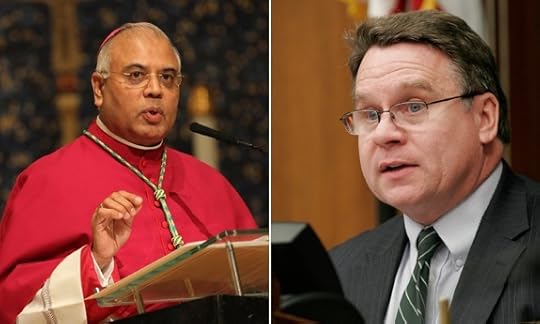
(Left) Archbishop Francis A. Chullikatt, the Vatican's permanent observer to the UN in New York; (right) Rep. Chris Smith, R-NJ. (CNS photos)
What Is the US Doing About Religious Persecution Worldwide? | John Burger | CWR
While President Obama calls religious freedom a “key objective of US foreign policy,” experts question how high a priority combating persecution really is.
Not a week after President Obama told the National Prayer Breakfast that promoting religious freedom is a “key objective of US foreign policy” under his administration, a congressman challenged him to put his money where his mouth is.
“The indifference on the part of the administration is shocking,” Rep. Christopher Smith, R-NJ, said in an interview February 11. Smith, who earlier in the day chaired a hearing on growing persecution of Christians worldwide, cited Obama’s failure to appoint a new Ambassador-at-Large for International Religious Freedom within the Department of State, a post mandated by the1998International Religious Freedom Act.
“A little-remembered fact about that [legislation] is that the Clinton administration was against it—on the record—only to sign it when we had an overwhelming veto-proof majorities in the House and the Senate,” Smith said in the interview. “But the hard lift in the early go, getting it out of the House and on the floor was unbelievable…. They were totally against it. So that mindset remains among certain appointees in the State Department.”
That may explain why the post has been vacant during much of Obama’s presidency, except for the two-and-a-half years it was held by Suzan Johnson Cook. Cook left the post in October.
Meanwhile, the persecution of Christians around the world is “expanding exponentially,” Smith told CWR. “There needs to be a concerted effort by the US government, and it has not been there. If anything, we’ve been enablers by our silence, and I mean the Obama administration by name. And then the more subtle forms of persecution and discrimination, like we’re seeing with the HHS mandate, which is by design and will be putting churches out of business if they are to prevail.”
Carl E. Olson's Blog
- Carl E. Olson's profile
- 20 followers




